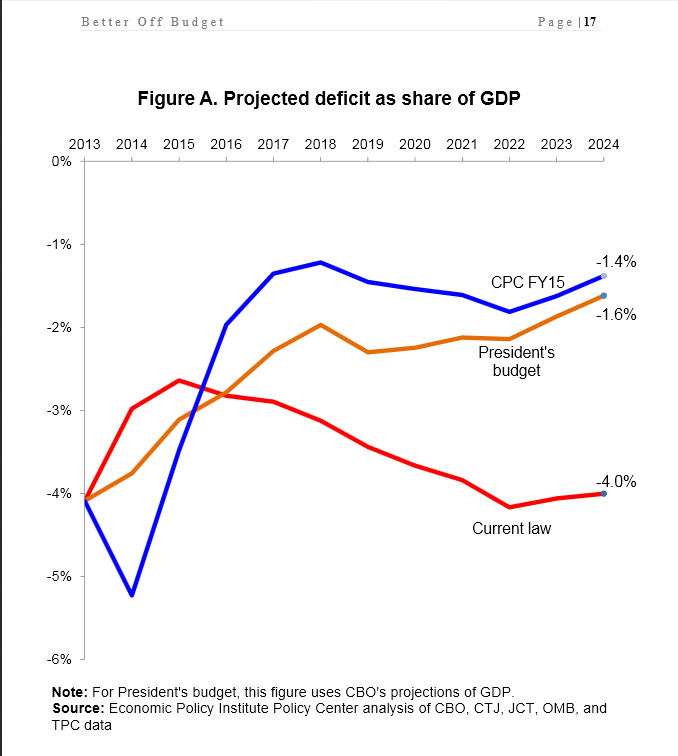Congressional Progressive Caucus’s Better Off Budget
I have found two Congressional publications so far for the Congressional Progressive Caucus’s Better Off Budget. The first is a 2 page summary.
When the federal budget invests resources wisely, we can meet the needs of working families and shrink the deficit. The Better Off Budget not only creates jobs, it reduces deficits by $4.08 trillion over the next 10 years. It’s the right budget for the country, for working families and for our future.
The second one goes a little deeper in 26 pages.
In a previous post Congressional Progressive Caucus Budget Strikes Back Against Austerity, I took the commentator to task for implying that increased spending must be “paid for”. Reading the two page summary, I didn’t find the statement to be quite as bad as the analyst implied.
Still, this two page summary might leave some people with the impression that cutting the deficit is an important issue to tackle. The above quote only mentions reducing the deficit in 10 years. Perhaps toward the end of the 10 years it might be appropriate to have some deficit reduction, but it must be clear that deficit reduction is completely unnecessary and unwanted until the recovery is much more robust and the income inequality is reduced significantly.
When I looked at the 26 page document, I did find some charts that plotted the deficit as a fraction of the gross domestic product.

This shows a very short term increase in the deficit and then a rapid decline in the deficit. By the beginning of 2015, the Better Off Budget deficit is smaller than the current law and smaller than the President’s proposed budget. I don’t have the capability of determining exactly when the deficit ought to start to decline as the economy recovers. A lot depends on the speed of the recovery and the needs of the economy for deficits.
As a rough measure, I bet it would be safe to say that a long term federal budget deficit that is a smaller share of the GDP than is the growth of the GDP in the same period of time would be a deficit that is well within the capability of the economy to handle without a hiccup.
If we could get a budget like this passed, it would probably be a good first step. My fear is that if it turns out that the economy does not recover as fast as hoped and the need for deficits does not go down as fast as hoped, voters will be left with the impression that this budget failed and we need to go back to austerity. This is what happened after the President’s too weak stimulus at the beginning of his term in office. Rather than recognizing that the stimulus and deficit were too small, and that they needed to be increased and tried for a longer period of time, the voters were convinced that the program was a failure and that we had to go in the opposite direction. (Or at least that is how the 2010 vote that turned the House Republican was interpreted by the nattering nabobs of negativism.)
The fact that President Obama was either too timid, or didn’t believe it himself, to explain what had happened, has made correcting the problem unnecessarily hard from a political point of view. The political problem is amply demonstrated by the need for a Congressional Caucus to publish a budget that is much better than the President’s proposed budget.